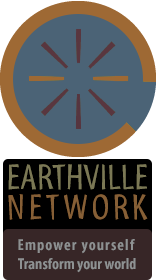Date/Time: Sep 10, 2023 - Sep 16, 2023, all day
Location: Earthville Institute, Colorado
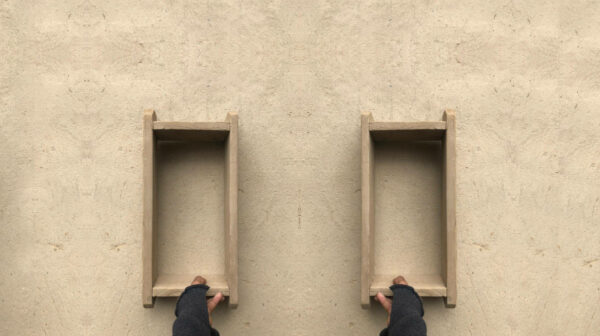
What: Hands-on training workshop
Topic: Earthen building techniques, including adobe, natural clay and lime plasters, and more
When: September 10-16, 2023, with option to stay on for an additional week (see below)
Where: Windhorse Village (approximately 28 miles west of Durango, Colorado, USA)
Language: English (translation may be available; contact us if needed)
Instructors: Mark Moore and Daphne Charles, with additional facilitation by James Simmons and Anya Chang-DePuy (see below)
Description: A week-long residential workshop exploring earthen building techniques and our connection to nature. Touching Earth will provide opportunities to learn and practice some of the foundational skills of earthen building and contemplate living in harmony with nature while enjoying a healthy and sustainable lifestyle in a beautiful part of Colorado. The one-week workshop will be followed by an optional practicum enabling interested participants to stay on for an additional week (until September 23) to advance your skills and deepen your knowledge by working alongside our team.
BUILDING WITH EARTH:
Sustainable, Healthy, Affordable & Beautiful Homes
There’s a reason that earthen building is enjoying a renaissance around the world: it is simply one of the wisest ways to build. The many benefits of earthen buildings and clay plasters include:
- Sustainability (one of the most eco-friendly ways to build)
- Human health (no toxic materials, vapor permeability while maintaining insulative qualities)
- Better thermal properties (balance of insulation and thermal mass)
- Optimal acoustic properties (good sound insulation and natural acoustic profile)
- Better fire resistance (compared with many conventional building materials)
- Affordability (especially when DIY with the support of friends)
- Natural beauty with a wide range of design flexibility
We can help you achieve these benefits in your own building, with an emphasis on best practices and a context-responsive approach that will support you to get the best results possible for your unique needs.
WHAT WE’LL BE LEARNING
This one-week workshop will explore some of the basic skills of earthen building, as well as some of the philosophical foundations, key concepts, and best practices.
Hands-on learning projects will include:
- Applying clay plaster to interior straw-bale walls
- Applying lime plaster to exterior straw-bale and mud-brick walls
- Making traditional adobe bricks (sun-dried blocks made of clay and a bit of straw)
- Masonry: building walls with mud bricks and mud mortar (including best practices, bond patterns, etc.)
- Creating optimal mud mixes for all of these applications (plasters, bricks and mortar), including DIY soil testing, harvesting, sieving, pugging (mixing with the feet), preparing, and testing the mixes
- Possible work on other projects
The hands-on work will be enriched by discussions, presentations, and other activities to provide greater depth and breadth of knowledge, including discussions of best practices for all of the above activities, and why each of them matters.
- A presentation on earth as a building material, including both the science of how earth holds together as a building material, and the art of earthen building as explored through a slideshow discussion of earthen architecture around the world (including our eco-campus in the Himalayas).
- An overview of other earthen building materials and techniques, with a look at the pros and cons of each, and how to evaluate the best materials and methods to use in your own unique situation.
- Daily morning yoga and meditation practice to ground into our earth body, restore balance and vitality.
- Discussions exploring our connection with the Earth, and with nature more generally, and how we cultivate a deeper sense of connectedness with nature in a cultural context that has lost most of that wisdom.
- Meditative nature walks on the 640-acre grounds, and other opportunities to observe the earth in the context of the site and discuss what we observe.
All of the above activities together will provide a well-balanced integration of theory and practice, will empower participants with basic skills and important sensitivities, and will provide a good foundation for further explorations (whether those might be with us or elsewhere).
ABOUT THE INSTRUCTORS
Earthville’s architecture faculty has been practicing and teaching natural building since 2010, with projects ranging from the Himalayas to Brazil, from Southeast Asia to here in the US.
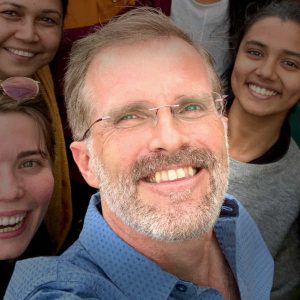
Mark Moore is a natural builder and experiential educator, founder of Earthville Network and cofounder of Dharmalaya Institute for Compassionate Living in the Himalayas. He studied vernacular eco-architecture and natural building for 12 years with the award-winning Didi Contractor of India, with whom he established an eco-architecture training program that has empowered hundreds of builders from around the world.
As a practitioner of meditation and a facilitator of retreats, he emphasizes a contemplative approach to design and building with sensitivity to nature and context, seeking the embodied integration of inner and outer sustainability.

Daphne Charles is the senior architectural instructor for Earthville’s programs worldwide and the chief architect for the Earthville Institute in Colorado. She is a holistic architect and designer working internationally and a licensed Biogeometry practitioner. Living and working in both Singapore and Australia, Daphne gained an early appreciation for diversity of experience and perspective.
Recognizing the universal importance of balance — in body, mind, relationship, and environments — led to Daphne’s twin professions as holistic architect and yoga teacher. Seeing that our “inner” and “outer” worlds are merely different aspects of the same whole, living system, as expressed in our ancient wisdom traditions, Daphne seeks in all her work to catalyze harmony between thought, action and manifestation.
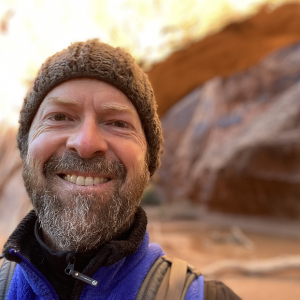 James Simmons has devoted over 20 years to leading and facilitating experiential education in wilderness, therapeutic, and international settings. He enjoys experiencing and observing how different environmental and cultural contexts enliven the spirit and assist us in shedding unhelpful habit patterns.
James Simmons has devoted over 20 years to leading and facilitating experiential education in wilderness, therapeutic, and international settings. He enjoys experiencing and observing how different environmental and cultural contexts enliven the spirit and assist us in shedding unhelpful habit patterns.
James spent a decade learning and teaching Aikido, a Japanese martial art translated as “the Way of Harmonizing Energy”. He believes there is no greater teacher than Mother Nature to show us this Way.
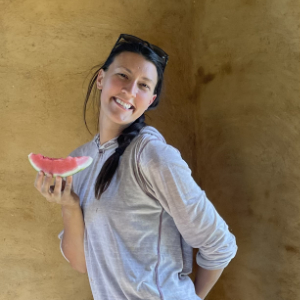 Anya Chang-DePuy has had the honor of being an experiential educator and wilderness guide in diverse communities and wild spaces around the globe. She has recently turned her focus towards cultivating deep relationship and roots with the homeland of the Earthville Institute in Colorado.
Anya Chang-DePuy has had the honor of being an experiential educator and wilderness guide in diverse communities and wild spaces around the globe. She has recently turned her focus towards cultivating deep relationship and roots with the homeland of the Earthville Institute in Colorado.
Though her creative spirit leads her into many different mediums, she is most moved by metal and stone. With much support and learning over the past year, she’s built a metalsmithing studio with strawbale walls, earthen plasters and a mud floor. She’s excited to continue learning and sharing with the Earthville community.
SCHEDULE
The workshop will begin at 9:00am on the first day and continue until 4:00pm on the last day. For the best experience, we recommend you plan to remain on site for the full time to allow yourself the opportunity to be fully immersed in the experience.
The daily schedule may vary somewhat from day to day, but in general would be something like this:
7:00 Morning practice (yoga/meditation) 8:00 Breakfast 9:00 Morning session 12:30 Lunch 2:00 Afternoon session 5:00 Wash up, rest 6:00 Dinner 7:00 Evening session (which might be Q&A/discussion/presentation, nature walk, music circle, or rest time, depending on context and interests) 8:30 Personal time
PRACTICUM OPTION
Those attending this workshop may be interested in gaining more learning and experience by remaining on for an additional week to work alongside our team from September 18-23. The daily schedule during the practicum week would be similar to the workshop schedule, but with more personal/social time in the evenings. If staying on for the second week, you’ll have Sunday the 17th off (perhaps to check out Durango or Mancos, or to explore the gorgeous Four Corners area, or simply to rest). If you’re interested in the practicum, let us know and we’ll be happy to discuss possibilities with you.
WHAT TO EXPECT
- Natural simplicity: Rustic facilities and undeveloped campsites in a beautiful forest setting. At this stage, we have outdoor showers with (limited) hot water, basic toilets and portapotties, and plenty of space to pitch your tent or park your trailer or RV (but no RV hookups).
- Supportive routine: A daily rhythm of contemplative practice, hands-on work, discussions, and time for rest and reflection.
- Full-time program focus: This program is immersive, meaning the point is to be completely focused on the program. While there will be some time for rest, reading/journaling, and personal reflection, there won’t be much time for pursuing other activities unrelated to the program. (That said, if you have things you must attend to, such as checking in on work or family, you’ll have time in the evenings you can use for that.)
- Plenty of physical work: Most of the work to be done is physical, and some of it requires physical endurance, so it’s best to be prepared both physically and psychologically for a lot of hard work. One key to happiness here is to keep a very positive and enthusiastic attitude about the work, knowing that you’re making the world a better place in a small way, which makes it a joy. (Of course each of us humans has physical limits, and we support everyone to stay within those and take care of our bodies.)
- Yogic lifestyle: Clean and simple community lifestyle in which everyone pitches in, including washing dishes, etc.
- Digital detox: To support the group to be present, focused, and connected with our experience and with one another, we’ll put our phones away. There will be no use of mobile phones or internet from 9-5 or during evening sessions. (There is scarcely any cell reception on site anyway, though those who really need connectivity will be welcome to use our Wi-Fi in the early morning or the evening.)
COSTS
Earthville Institute is a nonprofit organization devoted to making experiential learning and compassionate living accessible to all.
Recognizing that our participants come from diverse backgrounds, we provide a sliding scale with three tiers, to make it possible for everyone to donate according to their means.
Additionally, we wish to support local participation by providing the flexibility for local participants to have the option either to stay home and commute daily or to camp with us on the property. The rate for those camping with us includes three meals daily and space for camping, while the rate for those staying off site includes only lunch.
OPTION FOR THOSE WISHING TO CAMP ON-SITE
Total fees for the one-week minimum commitment for the program (including tuition, camping space, and three meals daily) are as follows:
- Standard rate: $540
- Subsidized rate (for low-income participants who can’t afford the standard rate*): $360
- Supporter rate (for those who can afford to give more to help subsidize the participation of lower-income participants and support the institute): $720
OPTION FOR THOSE WISHING TO STAY OFF-SITE
Total fees for the one-week minimum commitment for the program (including tuition and daily lunches, but not other meals) are as follows:
- Standard rate: $330
- Subsidized rate (for low-income participants who can’t afford the standard rate*): $220
- Supporter rate (for those who can afford to give more to help subsidize the participation of lower-income participants and support the institute): $440
PRACTICUM OPTION
Costs for the practicum (the second week) would be one third (33%) less than those for the first week. So, for example, the standard rate for camping on-site for the second week would be $360 instead of $540, making $900 total for the whole two weeks minus Sunday the 17th (and likewise for the other tiers).
SCHOLARSHIPS AVAILABLE
*We do not want cost to be a barrier to a sincere applicant’s participation, so if you have exceptional financial hardship and cannot afford even the lowest subsidized rate, you can contact us to let us know your situation and your needs, and we can discuss work-study discount and scholarship options (subject to limited availability and based on genuine need).
Members of the Ute and Diné (Navajo) nations qualify for full scholarships (subject to limited availability).
APPLICATION & REGISTRATION
To apply for this program, please submit the application form below.
We’ll be in touch with you as soon as we’ve had a chance to review your application.
Categories
